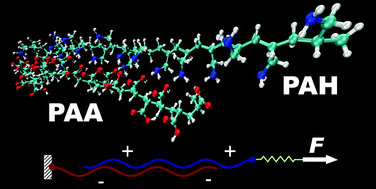Advances in nanoscale processing and simulation have led to the capability to directly control the mechanical properties of a material through change of its structural makeup at the nanoscale. A novel class of mechanomutable materials in which mechanical properties can be both tunable and reversible via in situ modifications of a material's nanostructure through stimuli such as pH, light, or electrical fields provides a promising strategy to develop stimuli-responsive polymer-composites. Here we report atomistic-level molecular dynamics (MD) studies, used to investigate the tunable adhesion properties of a polyelectrolyte complex consisting of poly(acrylic acid) (PAA) and poly(allylamine hydrochloride) (PAH) to elucidate the complexation and electrostatic cross-linking behavior of the constituent polymers of polyelectrolyte multilayer (PEM) systems. To accommodate a link between experimental and simulation results, a rate dependence investigation of the adhesion strength is undertaken to reconcile the time-scale limitations of atomistic simulations. A comparison with Atomic Force Microscopy experiments is provided, showing good agreement with simulation results. To investigate potential mutability of the system, we perform a systematic variation of the percent ionization of each constituent polymer. The ultimate strength of adhesion for the aligned polymers is shown to range from approximately 15 nN to 40 nN for an equivalent pH range of pH 2.5 to pH 10. Theoretical regimes of ionization extend the adhesion strength range from 8 nN to 45 nN, displaying the potential application of tunable, mechanomutable PAA/PAH systems. The findings reported here should be useful in steering experimental efforts in the characterization of polyelectrolyte multilayer composites.

You have access to this article
 Please wait while we load your content...
Something went wrong. Try again?
Please wait while we load your content...
Something went wrong. Try again?


 Please wait while we load your content...
Please wait while we load your content...